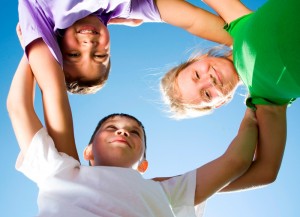

Social interactions can prove to be extremely difficult for children with ASD
Autistic Spectrum Disorders (ASD) cover a range of developmental disorders, including Autism, Asperger Syndrome and Rett’s Syndrome. ASD can involve a variety of symptoms, which fall into 3 main categories:
- Difficulties with social interaction
- Impaired language and communication
- Unusual patterns of behaviour and thought
Social interactions can be extremely difficult for children with ASD, and school can present a major challenge for them. Social skills groups are a frequent intervention in schools for children with ASD. Groups are typically organized on a weekly basis for a period of 12 or more weeks, with each session lasting 60 to 90 minutes. Lessons usually focus on a specific social skill with the following format:
- modeling of the skill,
- role-playing and practise of the skill,
- discussion, and
- individual feedback relating to the skill.
Although common practice, few studies have effectively measured the impact of social skills groups on people with ASD, and those that have show some varying results in efficacy. The Cochrane Collaboration has recently published a systematic review of the effect of social skills groups on people aged 6 to 21 with ASD.
What they did
The research team from the Cochrane Developmental, Psychosocial and Learning Problems Group, carried out a systematic review of 5 randomised controlled trials (RCT), comparing treatment (social skills groups) with a control group (no intervention, waiting list or treatment as usual). The majority of the 196 participants across the 5 trials were of primary school age (7 to 11 years).
The outcomes that were measured included the following:
- Social competence (the primary outcome and was measured through parent reports)
- Social communication
- Quality of life (e.g. loneliness, depression)
- Emotion recognition
What they found

There is some evidence that social skills groups improve social competence and friendship quality for children with ASD
There is some evidence that social skills groups improve:
- Overall social competence (Effect Size (ES) = 0.47, 95% confidence interval (CI) 0.16 to 0.78, P = 0.003)
- Friendship quality (ES = 0.41, 95% CI 0.02 to 0.81, P = 0.04)
No differences were found between treatment and control groups in relation to:
- Emotion recognition (ES = 0.34, 95% CI -0.20 to 0.88, P = 0.21) assessed in two studies
- Social communication as related to the understanding of idioms (ES = 0.05, 95% CI -0.63 to 0.72, P = 0.89), assessed in only one study
A single study suggested decreases in loneliness as a result of the intervention (ES = -0.66, 95% CI -1.15 to -0.17) and no effect on child or parental depression.
No adverse effects of social skills groups were reported in any of the studies.
The authors were clear to mention the limitations of the review:
- Small numbers of studies and participants
- High risk of bias as parents knew if their children were receiving the intervention or not
- All studies were from the US
- The studies mainly focused on children aged 7 to 12
- The studies mainly focused on people with average or above average intelligence
The authors concluded
There is some evidence that social skills groups can improve social competence for some children and adolescents with ASD. More research is needed to draw more robust conclusions, especially with respect to improvements in quality of life.
The Education Elf’s View
 Although the precise manner in which social skills groups change children’s social behaviour is unclear, it seems that children with ASD can learn to improve their social awareness and interactions through discussion and practice of appropriate social behaviours. It seems imperative, therefore, that children are diagnosed early and that interventions are put in place to ensure that people with ASD are taught the skills to communicate and interact more effectively.
Although the precise manner in which social skills groups change children’s social behaviour is unclear, it seems that children with ASD can learn to improve their social awareness and interactions through discussion and practice of appropriate social behaviours. It seems imperative, therefore, that children are diagnosed early and that interventions are put in place to ensure that people with ASD are taught the skills to communicate and interact more effectively.
It is clear that further studies are required to understand the range of social difficulties for people with ASD and to find suitable and specific interventions for them. Furthermore, the most effective methods of intervention need to be developed and refined so that people across the spectrum of disorders are given the best chance possible to become socially competent adults.
Links
Reichow B, Steiner AM, Volkmar F. Social skills groups for people aged 6 to 21 with autism spectrum disorders (ASD). Cochrane Database of Systematic Reviews 2012, Issue 7. Art. No.: CD008511. DOI: 10.1002/14651858.CD008511.pub2.
